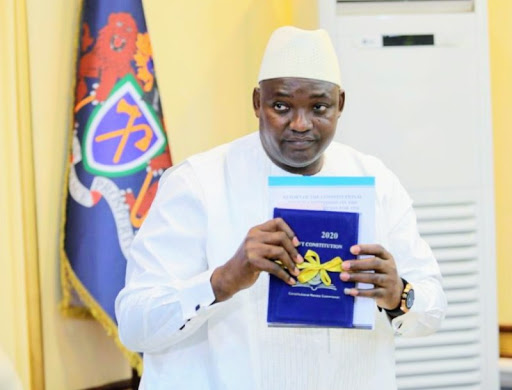By: Alieu Jallow
The road to democracy was ushered in 2016 when the Gambia went to the polls to change the president for the first time through the ballot box, a move that uprooted dictatorship after 22 years.

A new vision for The Gambia included a new constitution and accountability for past human rights violations. A Truth, Reconciliation and Reparations Commission was also established to probe human rights violations committed between July 1994 to January 2017.
As part of fulfilling the desires of the Gambians people, a commission was set up and tasked with drafting a constitution that reflects the wishes and aspiration of citizens thus ushering in the birth of a third republic. The new constitution would replace the 1997 constitution which supported the self-perpetuating design of the ex-leader.
The draft constitution was a fundamental agenda to the reform processes in the Gambia under the new regime as the country needed so many institutional reforms thus over D116 million was invested in the 2020 draft Constitution.
More than two years after the process began, and after a highly acrimonious and polarised parliamentary debate, the proposed Constitution Promulgation Bill, 2020 was voted out by the National Assembly.
This bill would have brought in a new constitution to replace the 1997 constitution, however, with 23 lawmakers voting against the backing of 31 MPs, it fell short of the three-quarters required to put it to a referendum.
A new constitution was one of the campaign promises of the Coalition 2016, intended to usher in a new dawn and promote secularism, good governance and multiparty democracy. Five years down the line, these promises are not met thus dashing away the hopes of Gambians.
The draft constitution introduced several measures aimed at enhancing and strengthening democracy. They included a presidential term limit, limits on executive power and greater political inclusion of marginalised groups (including women, youth and people with disabilities). It provided for a Bill of Rights chapter that complied with international and regional human rights standards, and provided for freedom of the media and access to information.
Madi Jobarteh, a human right activist, said the Barrow administration did not encourage the lawmakers that are affiliated with his government to support a yes vote for the draft constitution to pass.
Mr. Jobarteh stated that a lot of money spent on this draft constitution, an initiative by the Barrow’s government as such expects it in the forefront to advocate for its transient to ensure those NAMS affiliated to the President to vote for it.
Madi Jobarteh points out that the rejection of the draft constitution hugely influenced his vote in this year’s election.
Kaddijatou Jawo, a journalist, was “disappointed for the fact that the new constitution would have been the best thing ever Gambians were anticipating to happen when the new administration took over.”
“The new constitution would have paved the way for presidential term limits, which would have helped in the democratic process,’’ she said.
Ms Jawo is still optimistic that the new draft constitution would someday be approved, and that hopes are not entirely lost.
Mustapha Sonko, a Migration Officer at the National Youth Council, said there could have been a compromise among various parties to ensure the draft constitution was passed.
‘’I am disappointed not only with the current administration, but the fact that the entire process was debated based on interest, on political dimension,’’ he said.
During the campaign for votes in the December 4 presidential elections, some of the candidates (Essa Mbye Faal, Ousainou Darboe, Halifa Sallah) promised to bring the draft constitution back to life should they win. They did not.
Barrow, who won the polls with a margin of 25% between him and his main challenger, did not provide for the revival of the draft constitution in his party’s manifesto.
But on Tuesday December 7, he made a fresh promise to bring back the new draft constitution.

